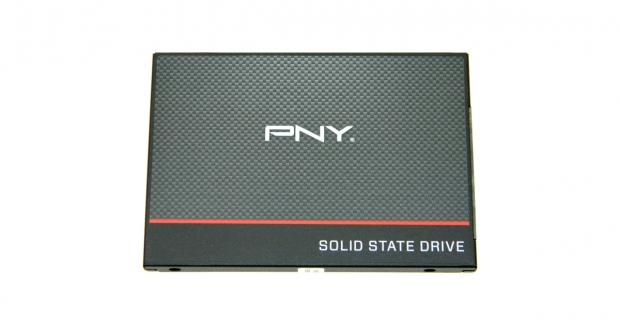
The Bottom Line
Introduction, Drive Specifications, and Pricing

Previously, we took a close look at PNY's flagship CS2211 XLR8 SATA III SSD. This Phison S10-powered SSD featured a 15nm Toshiba MLC flash array, which proved to be a potent combination. Today, we are taking a close look at PNY's super low-cost TLC variant, the CS1311. Like the CS2211, the CS1311 is powered by Phison's 8-channel quad-core S10 SSD controller. The CS1311 employs a Toshiba 15nm TLC (3-bit per cell) planar flash array as a significant cost lowering measure. Performance is down a notch with TLC flash, but it is still quite good, as you will see. What you lose in performance is more than made up for with a much lower price point, which is why PNY is selling a ton of CS1311 SSDs.
Phison's SSD controllers have proven to be among the industry's most reliable with integrated features like End-to-End Data Path Protection, SmartECC, SmartRefresh, SmartFlush, advanced wear-leveling, and garbage collection. Phison's S10 controller competes for market share mainly with SMI's 2256 controller and Marvell's 1074 controller. To assure quality and reliability, PNY's SSDs undergo rigorous validation and durability testing that includes hundreds of qualification tests, and over 10,000 hours of validation testing.
Like all modern TLC SSDs, PNY's CS1311 employs pSLC (pseudo-SLC) caching. Data that fits within the pSLC cache can be written at a blistering 520 MB/s; outside of the cache sustained write speeds drop to about 200 MB/s. The pSLC cache does more than just mask the write performance of TLC flash; it helps extend the endurance of the flash by sequentializing random data before it is written to the larger TLC NAND array.
PNY states that their CS1311 SSD is up to 24x faster than a mechanical HDD. They are marketing the CS1311 as a low-cost user upgrade that will breathe new life into your current PC. We agree, an older computer with an SSD will deliver a much better user experience than a new computer that is utilizing a mechanical HDD. If you haven't used an SSD before, what are you waiting for? PNY's low-cost CS1311 SSDs deliver performance that will literally transform your clunky PC into a powerhouse. If you have a laptop or notebook PC that is running an HDD, it gets even better. Laptop users that upgrade to an SSD will benefit from significantly longer battery life, lower temperatures, silent operation, and if you happen to drop your device, you won't bork your drive. Life is good when you have an SSD; now let's see how PNY's CS2211 stacks up against the competition.
Specifications
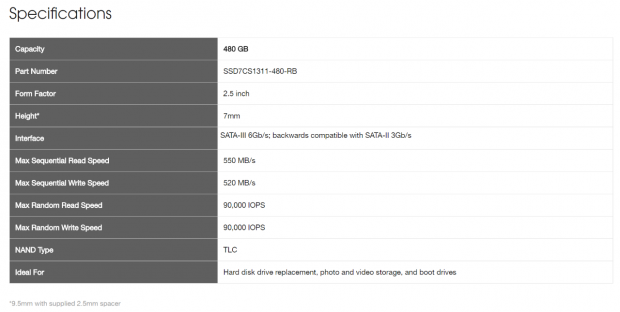
PNY's CS1311 2.5"x7mm SATA III SSD is available in four capacities: 120GB, 240GB, 480GB, and 960GB. The 480GB model we have on the bench has the following factory specifications:
- Sequential Read: up to 550 MB/s
- Sequential Write: up to 520 MB/s
- Max 4K Random Read Speed: up to 90,000 IOPS
- Max 4K Random Write Speed: up to 90,000 IOPS
The CS1311 retail package includes Acronis HD cloning software and a 2.5mm stick-on plastic spacer.
PNY backs their CS1311 with a three-year limited warranty. PNY does not list a TBW (Total Bytes Written) limit during the three-year warranty period. Additionally, PNY offers US-based technical support that is available 24/7. PNY's CS1311 480GB SATA III SSD is currently selling for $129.99 at Amazon, Newegg, and direct from PNY.
Drive Details
PNY CS1311 480GB SATA III SSD
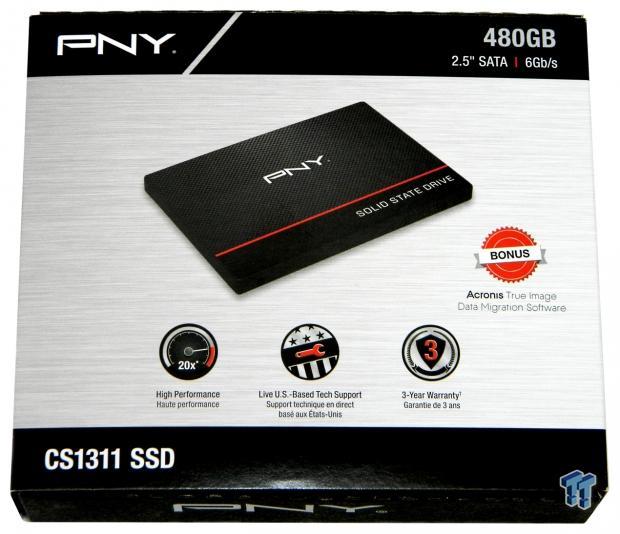
Retail packaging features an image of the enclosed SSD on the front of the box. The front of the packaging advertises the enclosed drive's capacity, three-year warranty, and included Acronis migration software.
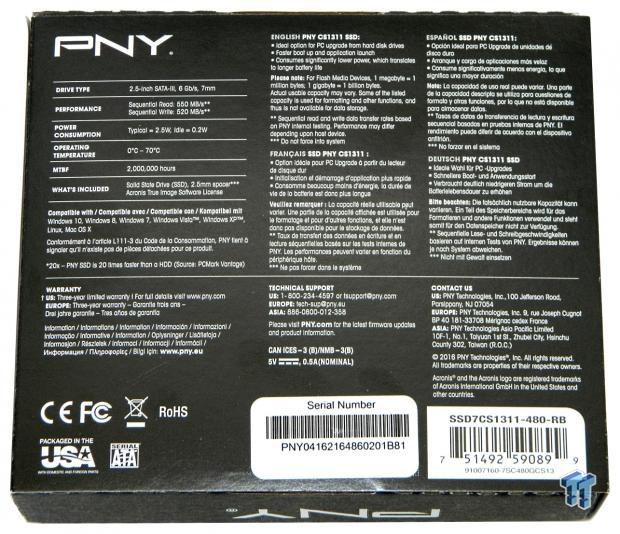
The rear of the packaging lists the drive's sequential performance specifications, MTBF rating of two million hours, included accessories, and various bits of relevant information.
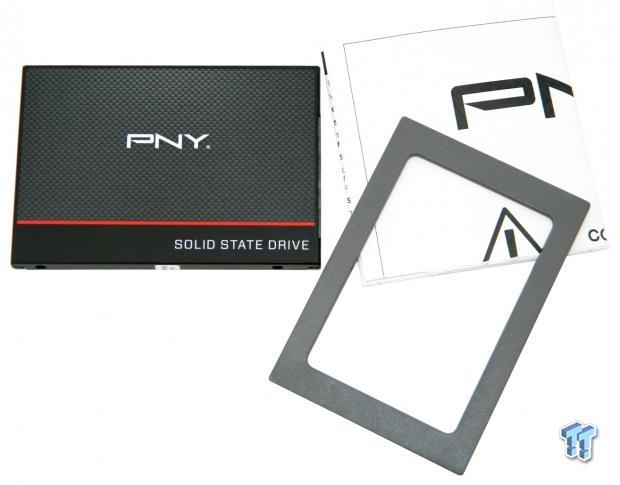
Inside the packaging is the drive itself, a stick-on plastic spacer, and a printed user guide that includes an Acronis key.
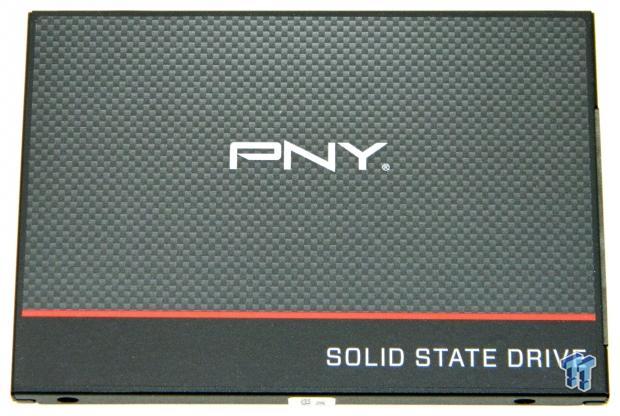
The top of the drive's black aluminum snap-together enclosure is covered with an attractive label that has a carbon fiber look to it.
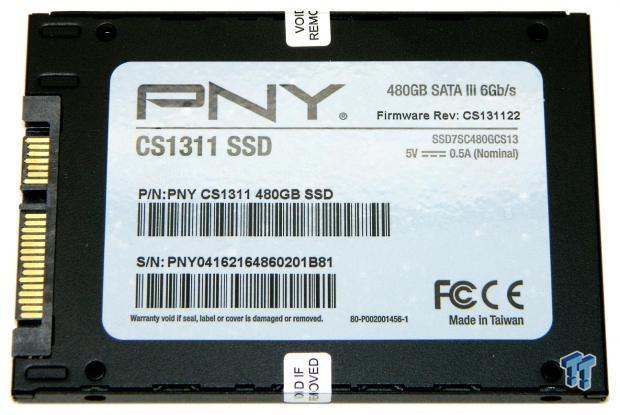
The back half of the drive's enclosure features a manufacturer's label listing the particulars of the drive.
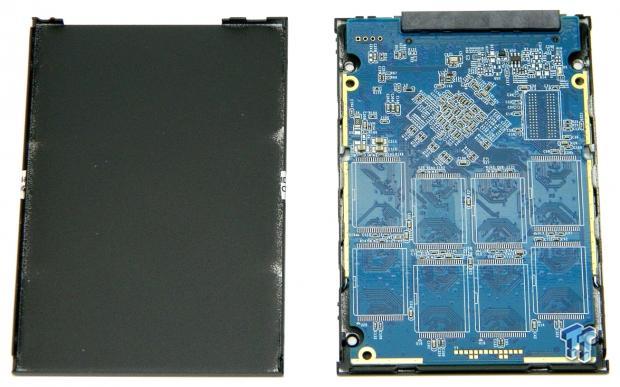
The PCB snaps into place onto the top half of the drive's enclosure.
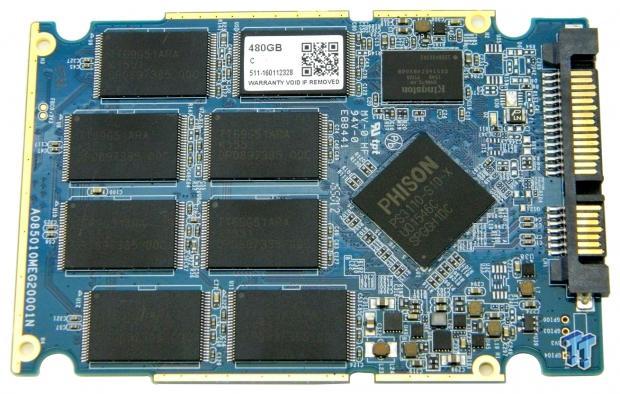
This half of the PCB houses the drive's Phison S10 controller, eight 64GB 15nm Toshiba planar TLC flash packages, and a single Kingston branded 512MB DDR3 1600MHz cache package.
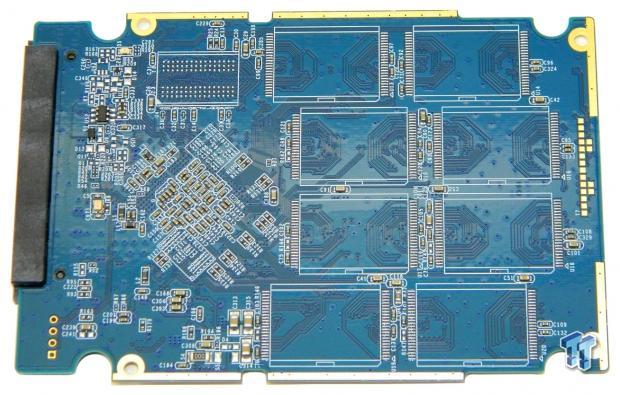
This side of the PCB is devoid of components.
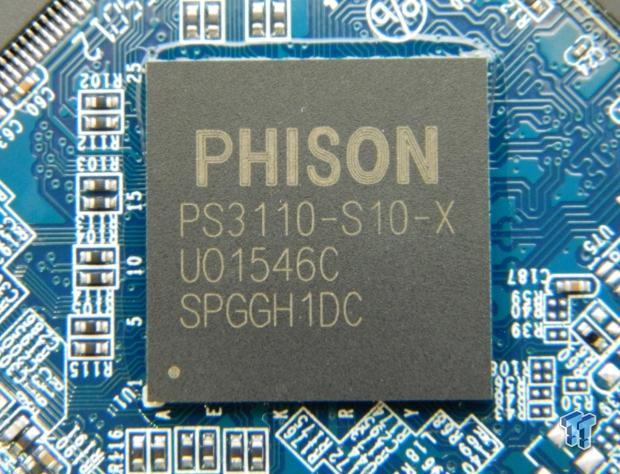
A detailed view of the Phison PS3110-S10-X quad-core eight-channel SATA III controller that powers the CS1311.
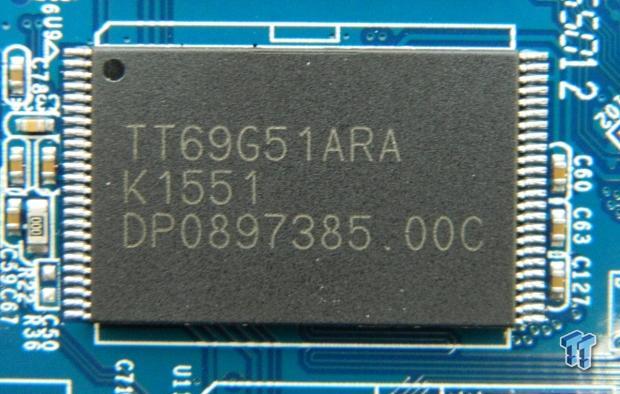
A detailed view of one of the drive's eight 64GB Toshiba 15mn TLC TSOP flash packages.
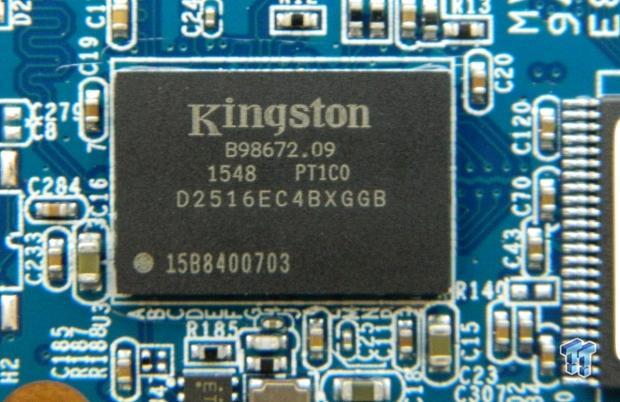
A detailed view of the drive's Kingston branded 512MB DDR3 1600MHz cache package.
Test System Setup and Properties
Jon's Consumer SSD Review Test System Specifications
- Motherboard: ASRock Extreme9 Z97 - Buy from Amazon
- CPU: Intel Core i7 4790K @ 4.8GHz - Buy from Amazon / Read our review
- Cooler: Swiftech H2O-320 Edge - Buy from Amazon / Read our review
- Memory: Corsair Dominator DDR3 32GB 2400MHz - Buy from Amazon
- Video Card: Onboard Video
- Case: IN WIN X-Frame - Buy from Amazon / Read our review
- Power Supply: Seasonic Platinum 1000 Watt Modular - Buy from Amazon / Read our review
- OS: Microsoft Windows 10 Professional 64-bit - Buy from Amazon
- Drivers: Intel RAID option ROM version 13.0.0.2075 and Intel RST driver version 13.6.0.1002
We would like to thank ASRock, Crucial, Intel, Corsair, RamCity, IN WIN, and Seasonic for making our test system possible.
Drive Properties
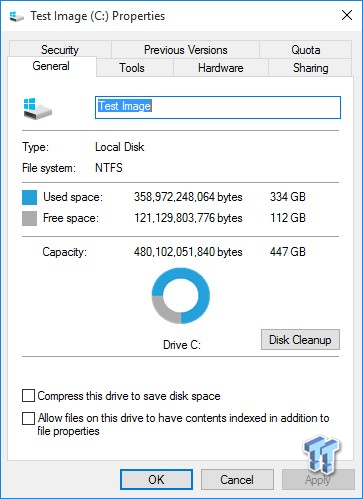
The majority of our testing is performed with our test drive as our boot volume. Our boot volume is 75% full for all OS Disk "C" drive testing to replicate a typical consumer OS volume implementation. We feel that most of you will be utilizing your SSDs for your boot volume and that presenting you with results from an OS volume is more relevant than presenting you with empty secondary volume results.
System settings: Cstates and Speed stepping are both disabled in our systems BIOS. Windows High-Performance power plan is enabled. Windows write caching is enabled, and Windows buffer flushing is disabled. We are utilizing Windows 10 Pro 64-bit OS for all of our testing except for our MOP (Maxed-Out Performance) benchmarks where we switch to Windows Server 2008 R2 64-bit.
Synthetic Benchmarks – ATTO & Anvil Storage Utilities
ATTO
Version and / or Patch Used: 2.47
ATTO is a timeless benchmark used to provide manufacturers with data used for marketing storage products.
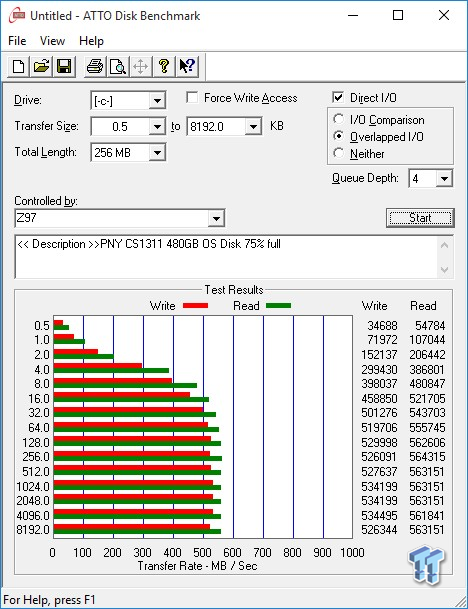
Compressible sequential read/write transfers max out at 564/534 MB/s. Keep in mind this is our OS volume, and it is filled to 75% of its total capacity. Maximum sequential read performance is achieved at a 256KB transfer size, maximum sequential write performance at 1MB transfers.
Sequential Write
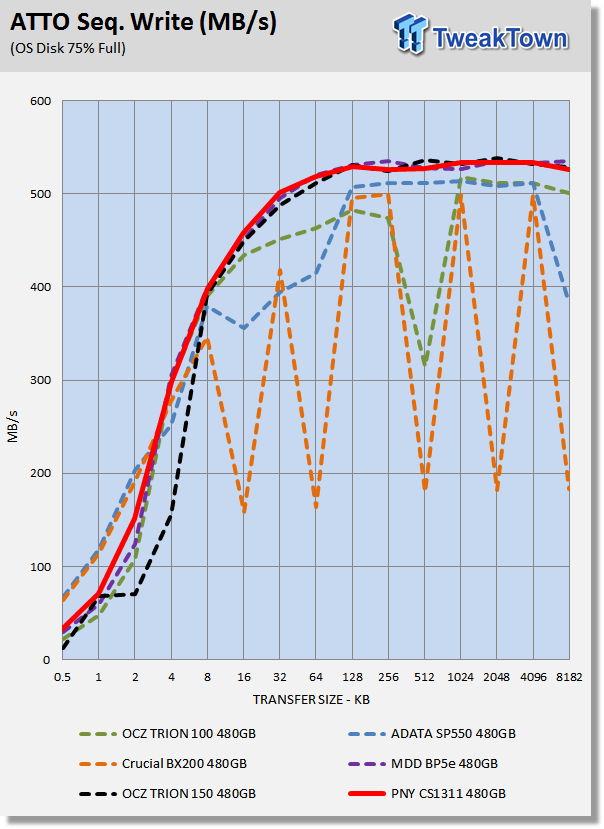
The CS1311 delivers particularly strong performance from 4KB on up to 8MB transfers.
Sequential Read
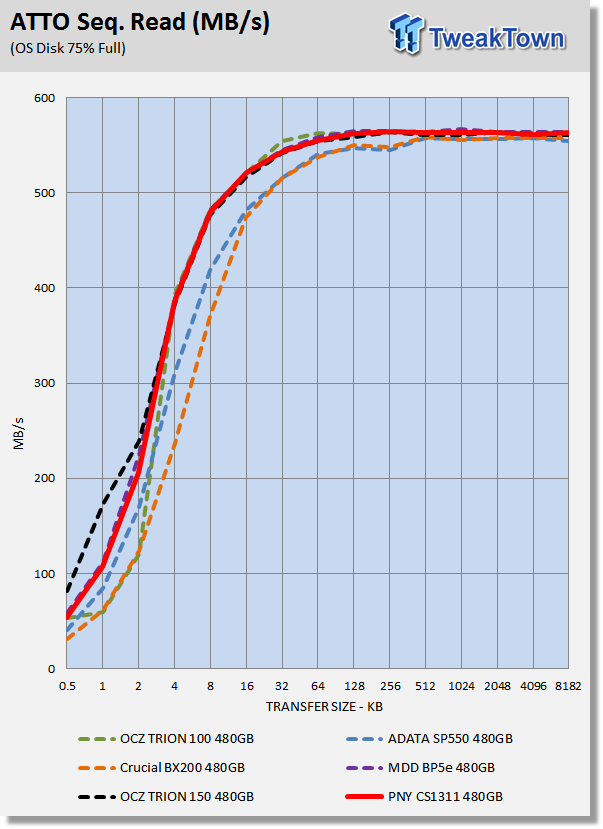
The CS1311 runs strong throughout the test. OCZ's TRION 150 has the best small file performance of the bunch. ADATA's SP550 and Crucial's BX200 are handily outperformed for the majority of the test, but both manage to finish the test with high marks.
Anvil Storage Utilities
Version and / or Patch Used: 1.1.0
Anvil's Storage Utilities is a storage benchmark designed to measure the storage performance of SSDs. The Standard Storage Benchmark performs a series of tests; you can run a full test or just the read or write test, or you can run a single test, i.e. 4k QD16.
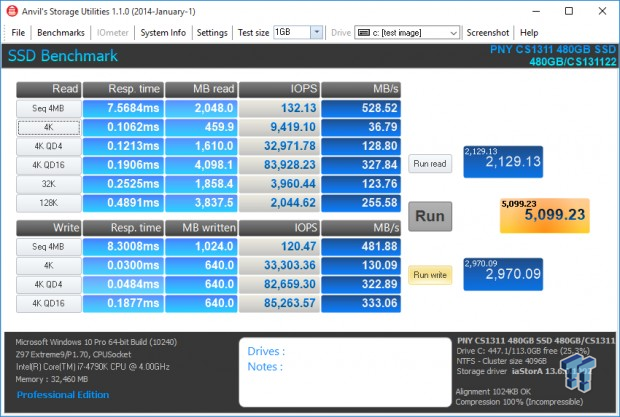
Scoring
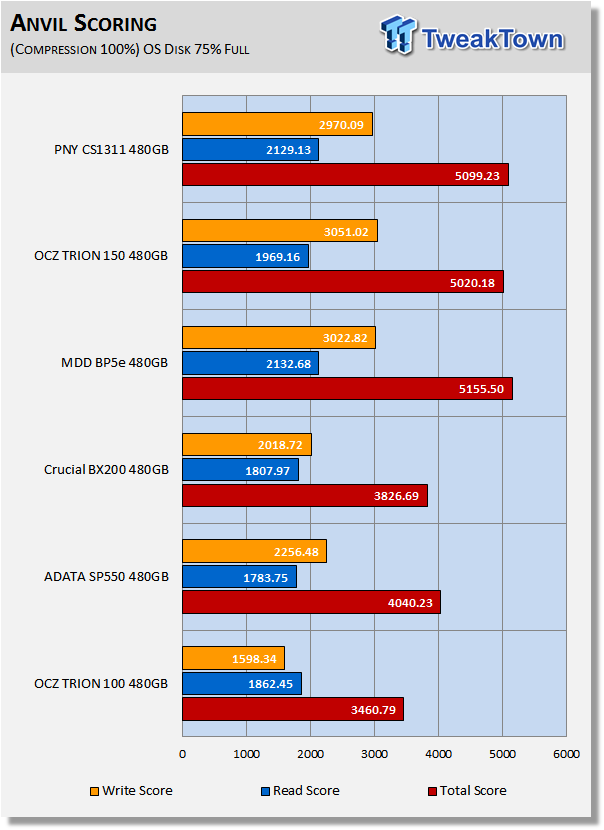
Anvil's scoring gives a good indication of a drive's overall performance. PNY's CS1311 scores well over 5000 which is always a good indication that a drive is capable of delivering top-notch performance. The CS1311, Trion 150, and MDD BP5e all perform similarly which is no surprise because all three SSDs are similarly configured.
(Anvil) Read IOPS through Queue Depth Scale
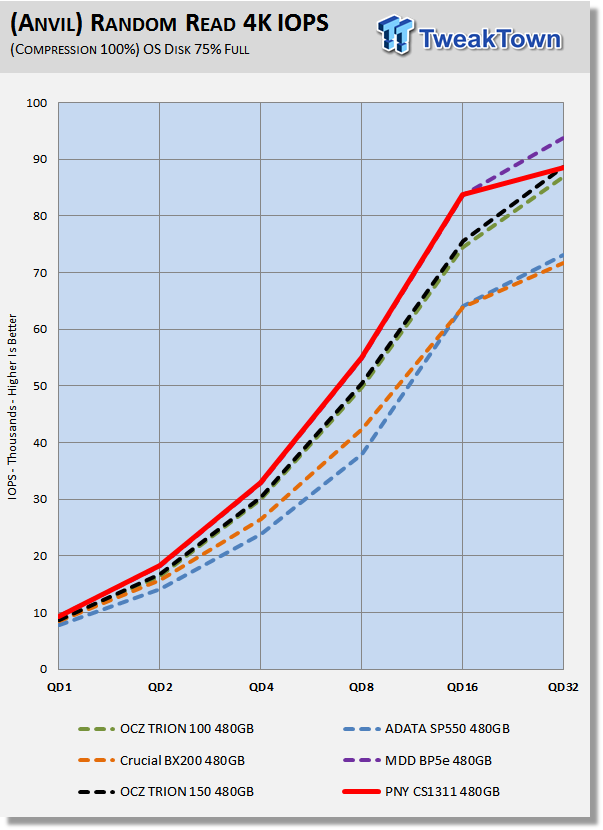
The CS1311 and BP5e outperform the rest of the drives in our test pool. They both track identically up to QD16, where the CS1311 drops off a bit and the BP5e finishes the testing with higher IOPS at QD32.
(Anvil) Write IOPS through Queue Scale
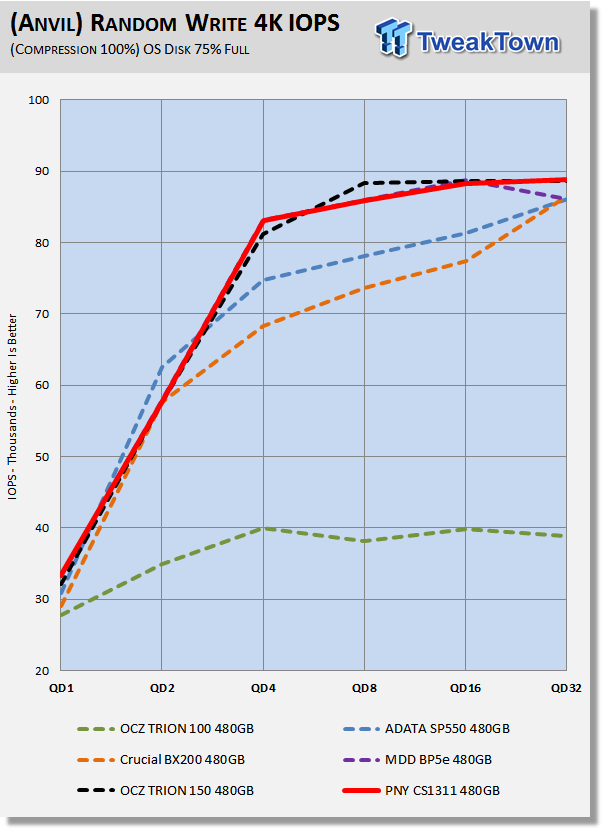
The CS1311 and the BP5e again track identically up to QD16. Both drives deliver the best performance of the bunch at the all-important QD1. ADATA's SP550 leads the field at QD2, but at higher queues, it fails to deliver comparable performance to the S10-powered SSDs in our test pool.
Synthetic Benchmarks – CrystalDiskMark & AS SSD
CrystalDiskMark
Version and / or Patch Used: 3.0 Technical Preview
CrystalDiskMark is disk benchmark software that allows us to benchmark 4k and 4k queue depths with accuracy. Note: Crystal Disk Mark 3.0 Technical Preview was used for these tests since it offers the ability to measure native command queuing at QD4.
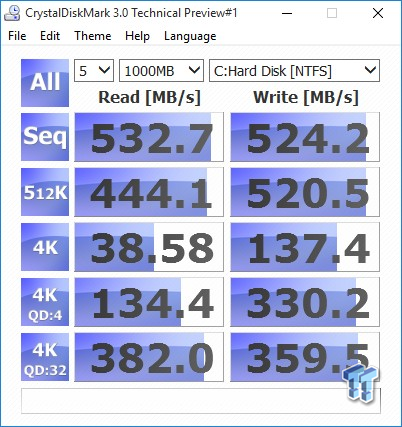
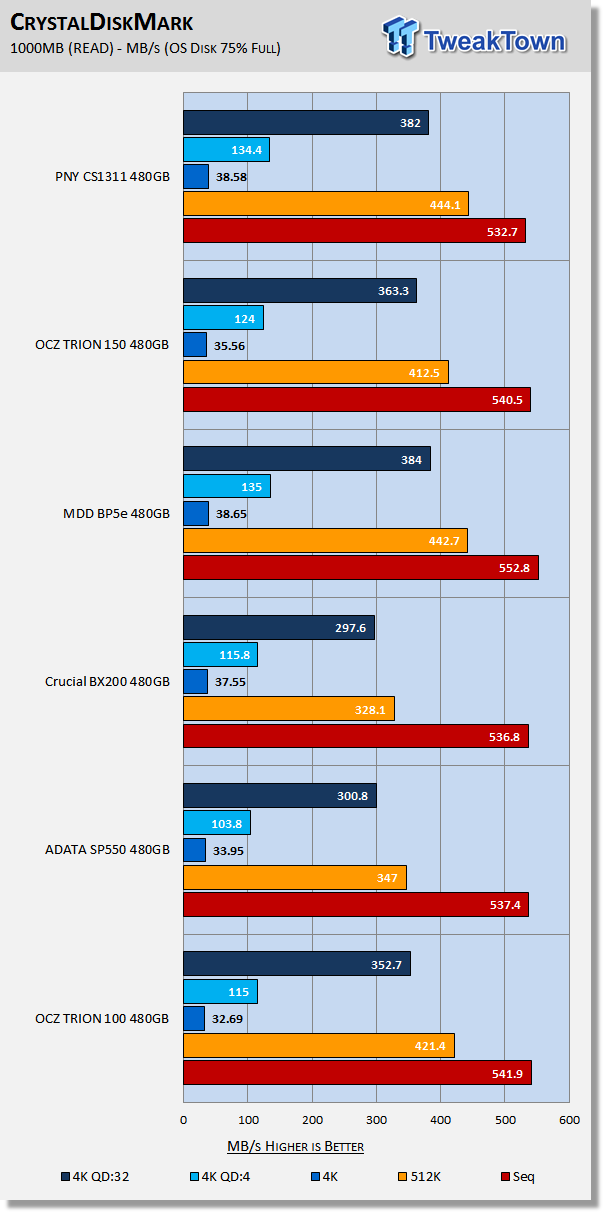
The CS1311 beats out the rest of the test pool at 512K transfers. The TRION 150 and BP5e deliver the best sequential performance. We note the stout performance of PNY's CS1311 at 4K QD1-QD4.
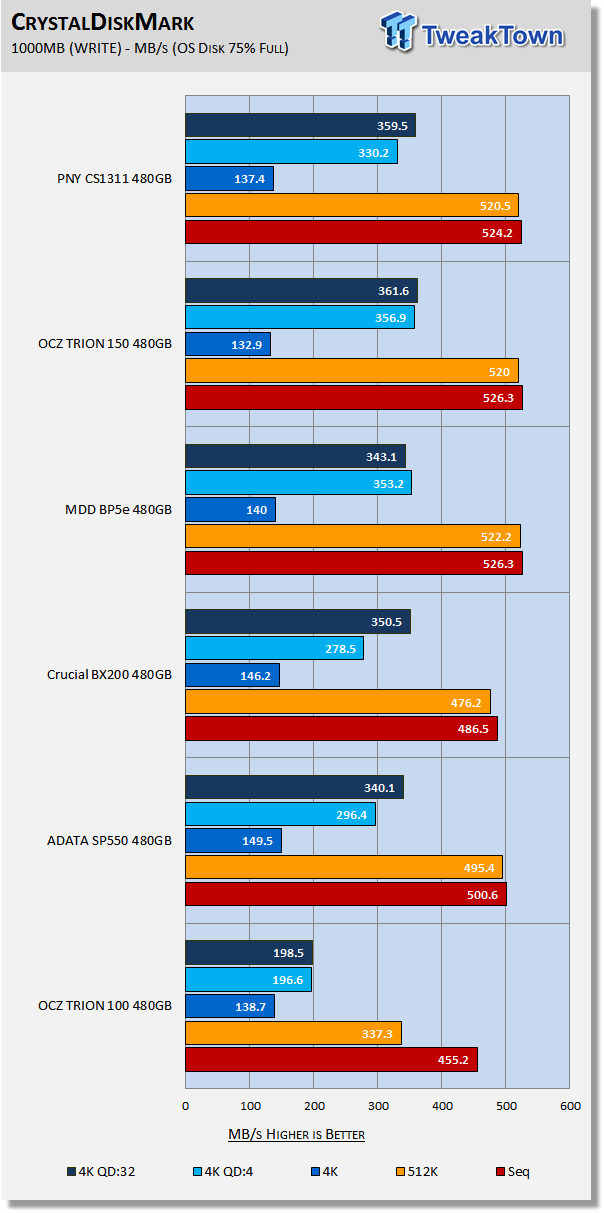
ADATA's SP550 wins for the best 4K QD1 write performance. MDD's BP5e delivers the best all-around performance of the bunch, just slightly surpassing the CS1311.
AS SSD
Version and / or Patch Used: 1.7.4739.38088
AS SSD determines the performance of SSDs. The tool contains four synthetic as well as three practice tests. The synthetic tests are to determine the sequential and random read and write performance of the SSD.

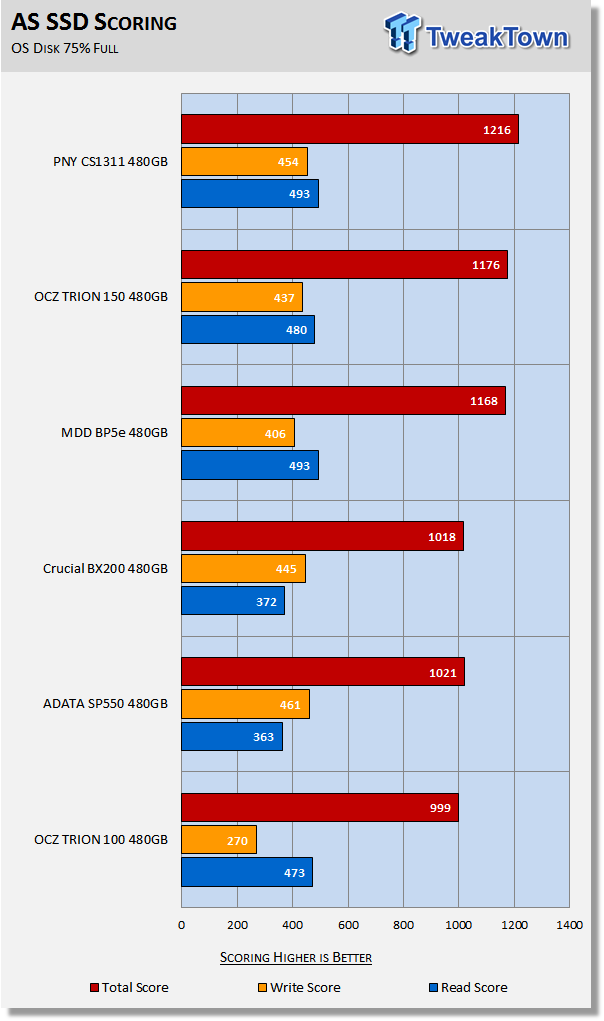
The CS1311 manages to set a new record lab record for planar flash TLC SSDs, exacting a bit of vengeance on MDD's BP5e. A score of over 1200 is an elite score that most SATA SSDs are not capable of delivering. Keep in mind the CS1311 is one of the lowest-cost SSDs currently on the market.
Benchmarks (Trace-Based OS Volume) - PCMark Vantage, PCMark 7 & PCMark 8
Moderate Workload Model
We categorize these tests as indicative of a moderate workload environment.
PCMark Vantage - Hard Disk Tests
Version and / or Patch Used: 1.2.0.0
The reason we like PCMark Vantage is because the recorded traces are played back without system stops. What we see is the raw performance of the drive. This allows us to see a marked difference between scoring that other trace-based benchmarks do not exhibit. An example of a marked difference in scoring on the same drive would be empty vs. filled vs. steady state.
We run Vantage three ways. The first run is with the OS drive 75% full to simulate a lightly used OS volume filled with data to an amount we feel is common for most users. The second run is with the OS volume written into a "Steady State" utilizing SNIA's guidelines. Steady state testing simulates a drive's performance similar to that of a drive that been subjected to consumer workloads for extensive amounts of time. The third run is a Vantage HDD test with the test drive attached as an empty, lightly used secondary device.
OS Volume 75% Full - Lightly Used
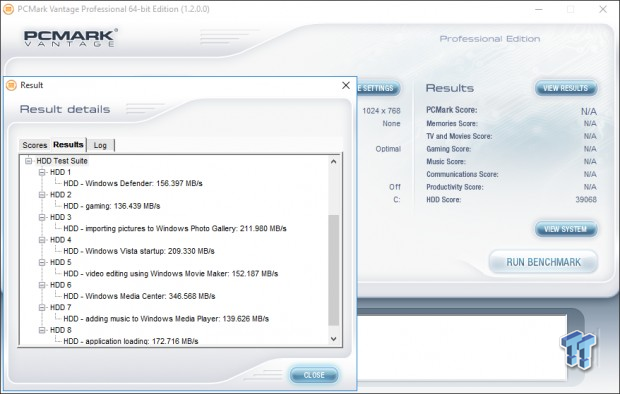
OS Volume 75% Full - Steady State
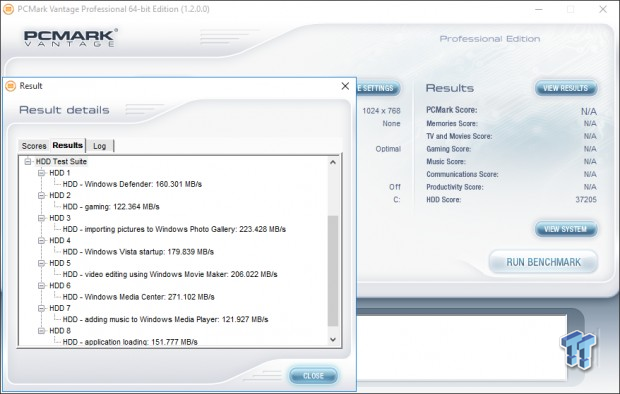
Secondary Volume Empty - FOB
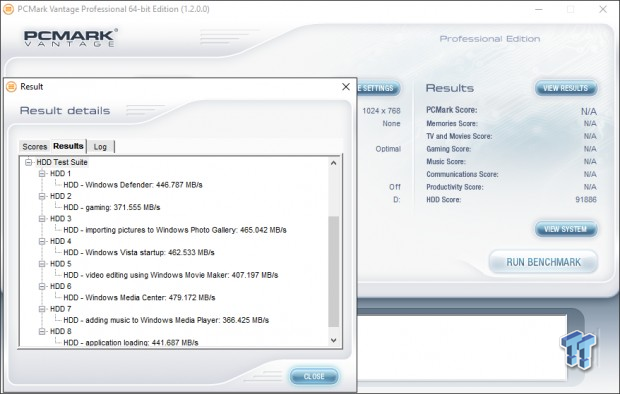
There's a big difference between an empty drive, one that's 75% full/used, and one that's in a steady state.
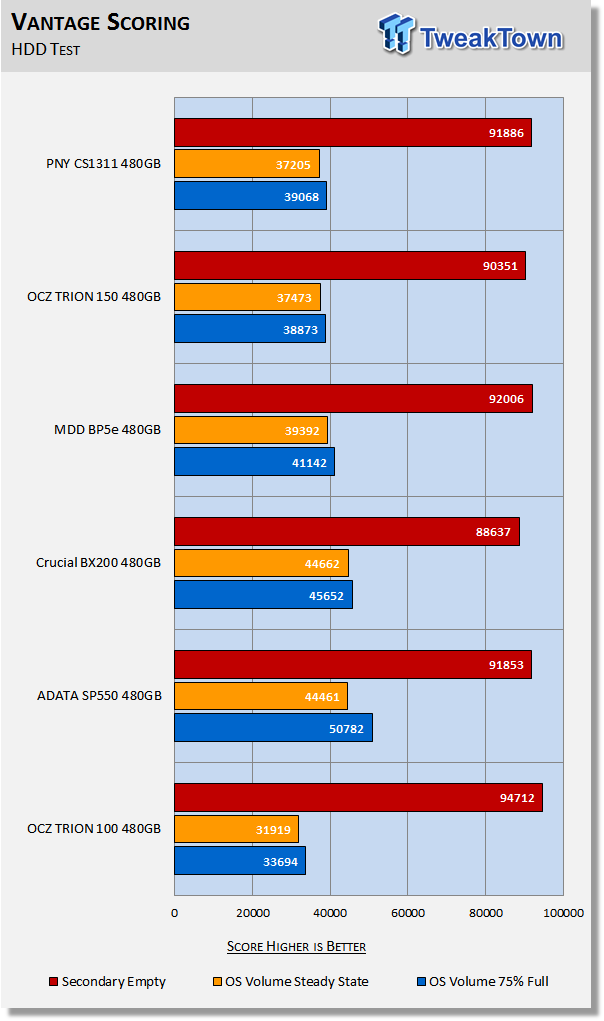
The important scores to pay attention to are "OS Volume Steady State" and "OS Volume 75% full." These two categories are most important because they are indicative of typical of consumer user states. When a drive is in a steady state, it means garbage collection is running at the same time it's reading/writing. This is exactly why we focus on steady state performance.
Looking strictly at steady-state performance, Crucial's MX200 pulls off a rare win. SMI 2256 controlled SSDs don't deliver good synthetic performance, but when it comes to moderate workloads, they typically have the edge over S10-controlled SSDs.
PCMark 7 - System Storage
Version and / or Patch Used: 1.4.0
We will look to Raw System Storage scoring for evaluation because it's done without system stops and, therefore, allows us to see significant scoring differences between drives.
OS Volume 75% Full - Lightly Used
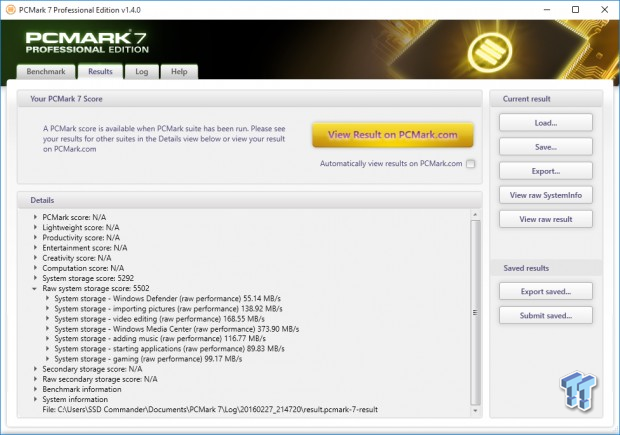
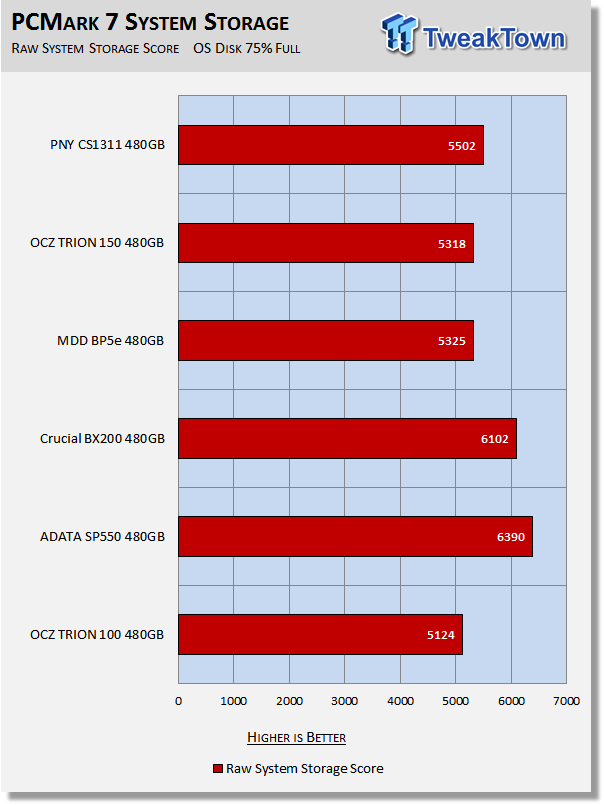
ADATA's SP550 wins this test, again showing the 2256 controller to be superior with moderate workloads. The CS1311 easily outperforms the rest of the S10-powered drives in our test pool.
PCMark 8 - Storage Bandwidth
Version and / or Patch Used: 2.4.304
We use PCMark 8 Storage benchmark to test the performance of SSDs, HDDs, and hybrid drives with traces recorded from Adobe Creative Suite, Microsoft Office, and a selection of popular games. You can test the system drive or any other recognized storage device, including local external drives. Unlike synthetic storage tests, the PCMark 8 Storage benchmark highlights real-world performance differences between storage devices.
OS Volume 75% Full - Lightly Used
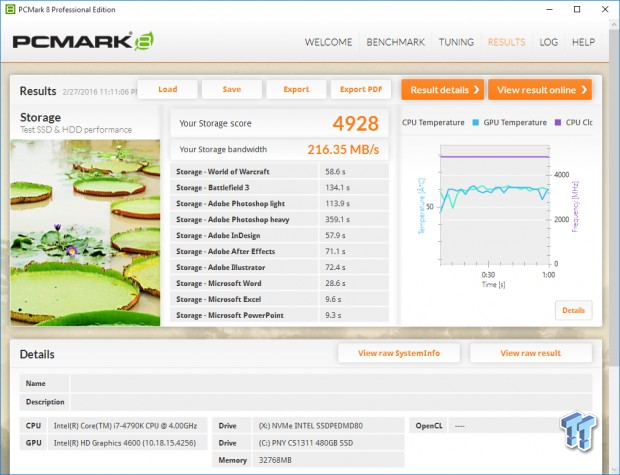
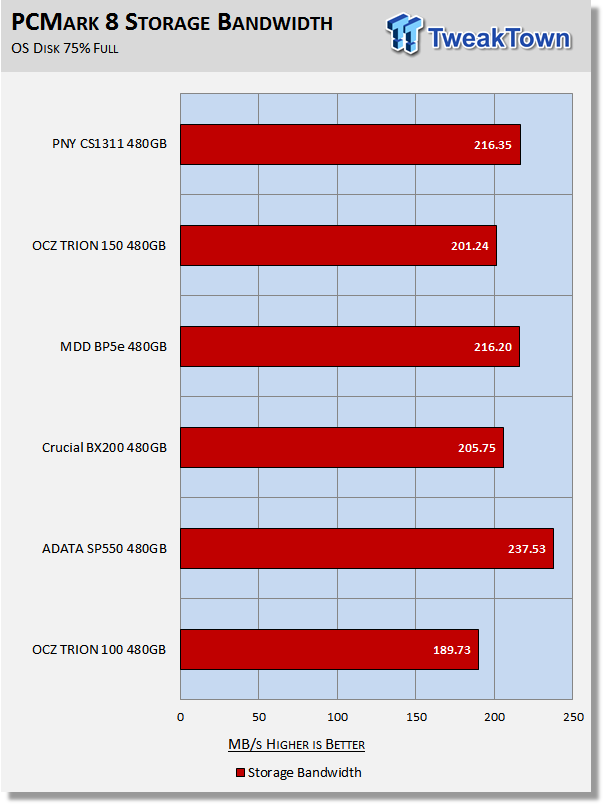
PCMark 8 is the most intensive moderate workload simulation we run. With respect to moderate workloads, this test is what we consider the best indicator of a drive's performance. The SP550 takes the win once again. The CS1311 takes second place, again outperforming the competing S10-powered competition.
Benchmarks (Secondary Volume) – Max IOPS, Disk Response & Transfer Rates
Iometer – Maximum IOPS
Version and / or Patch Used: Iometer 2014
We use Iometer to measure high queue depth performance. (No Partition)
Max IOPS Read
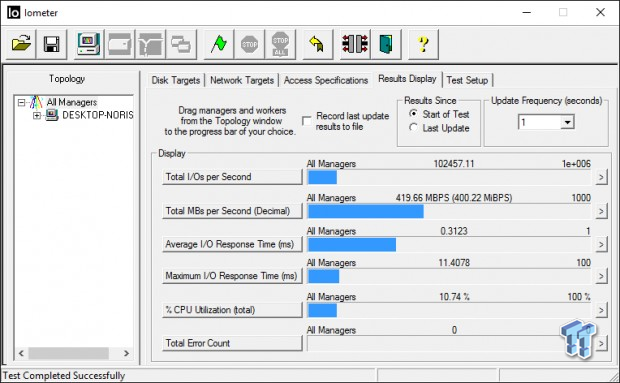
Max IOPS Write
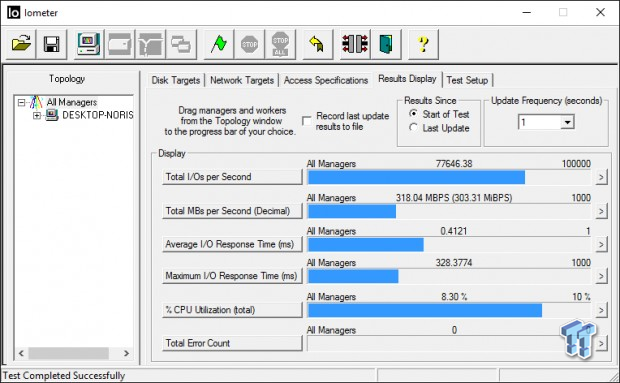
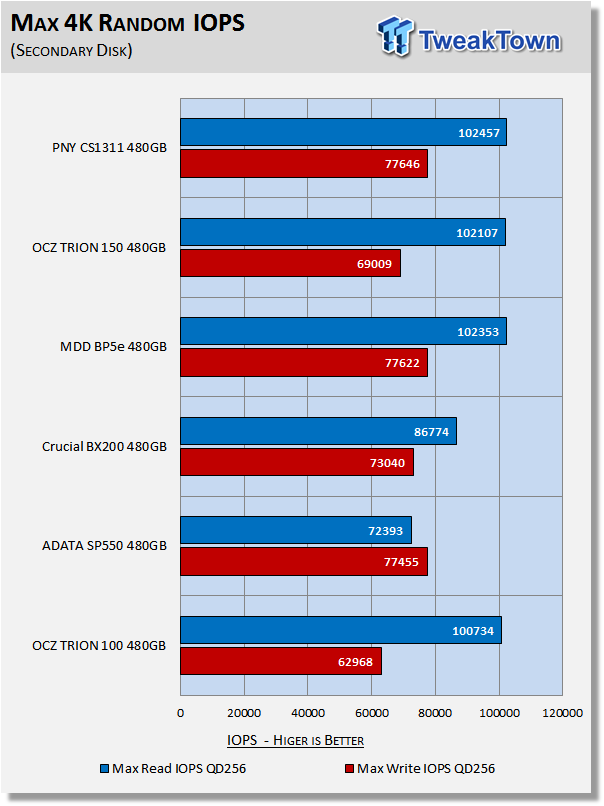
PNY's CS1311 wins this test outright. With our configuration, we are able to easily exceed PNY's 90K maximum read IOPS specification. The CS1311 delivers the highest read IOPS of our test pool.
We are not able to sustain PNY's 90K maximum write IOPS specification for more than a few seconds, which is common for planar-based TLC SSDs. By the end of our 30-second test, the drive falls to 77,646 IOPS, however, this is still enough to beat the rest of the SSDs in our test pool.
Iometer – Disk Response
Version and / or Patch Used: Iometer 2014
We use Iometer to measure disk response times. Disk response times are measured at an industry accepted standard of 4K QD1 for both write and read. Each test runs twice for 30 seconds consecutively, with a 5-second ramp-up before each test. We partition the drive/array as a secondary device for this testing.
Avg. Write Response
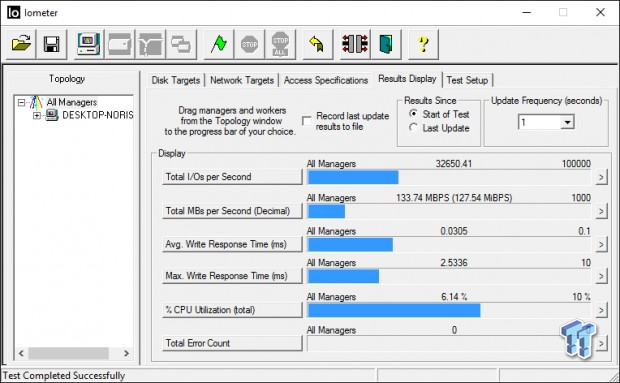
Avg. Read Response
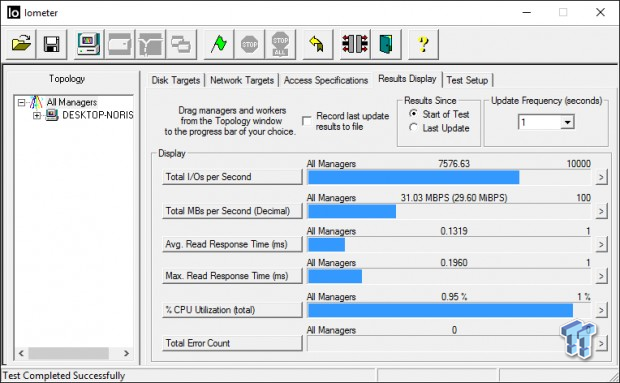
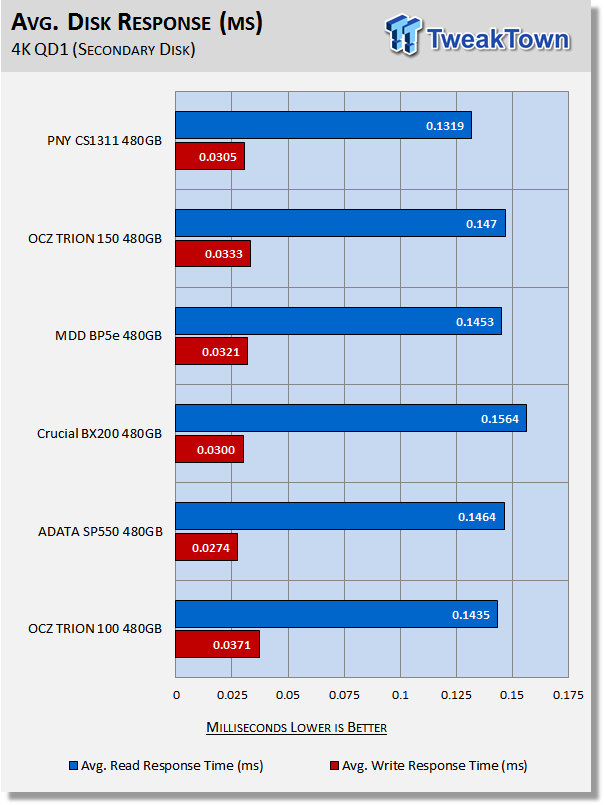
The CS1311 delivers by far the best read response of the bunch, and the SP550 the best write response. Comparing the CS1311 to the other similarly configured S10-powered SSDs in our test pool reveals that the CS1311 delivers the lowest (best) latency.
DiskBench - Directory Copy
Version and / or Patch Used: 2.6.2.0
We use DiskBench to time a 28.6GB block (9,882 files in 1,247 folders) composed primarily of incompressible sequential and random data as it's transferred from our DC P3700 PCIe NVME SSD to our test drive. We then read from a 6GB zip file that's part of our 28.6GB data block to determine the test drive's read transfer rate. Our system is restarted prior to the read test to clear any cached data, ensuring an accurate test result.
Write Transfer Rate
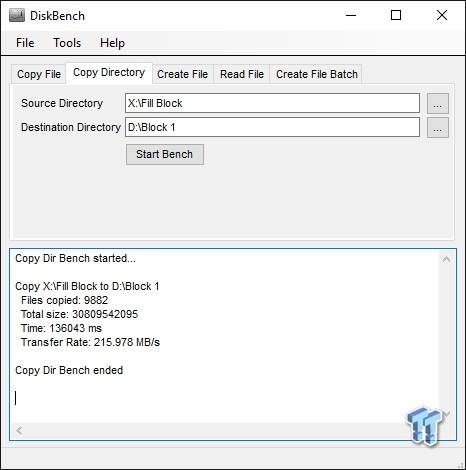
Read Transfer Rate
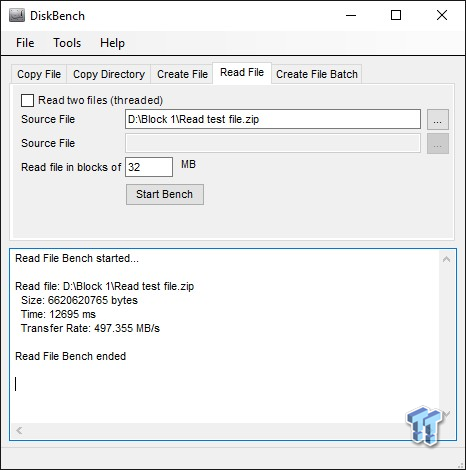
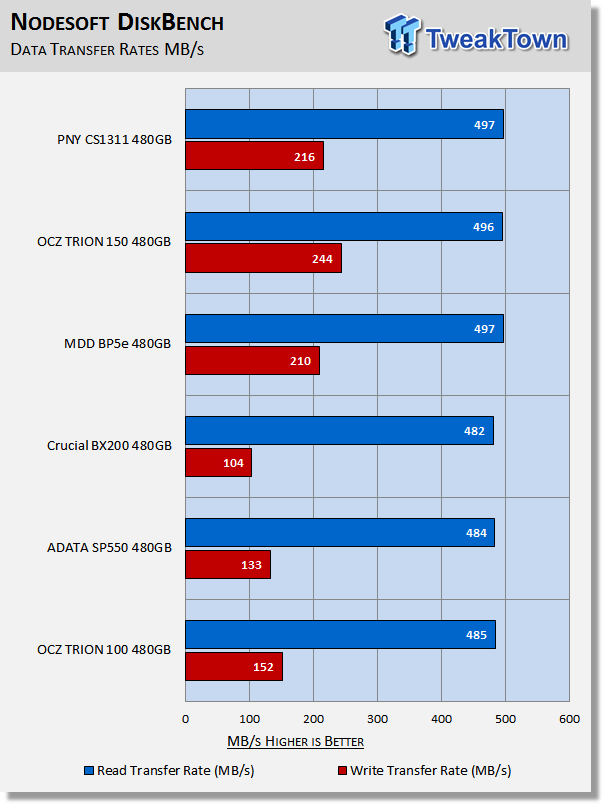
We place particular importance on this testing when comparing planar-based TLC SSDs. Looking at sustained write transfer rates shows exactly why we prefer S10-powered planar TLC SSDs to SMI-powered planar TLC SSDs.
The SMI powered drives are actually slower than a typical desktop mechanical HDD when writing large blocks of data.
Benchmarks (Secondary Volume) - PCMark 8 Extended
Futuremark PCMark 8 Extended
Heavy Workload Model
PCMark 8's consistency test simulates an extended duration heavy workload environment. PCMark 8 has built-in, command line executed storage testing. The PCMark 8 Consistency test measures the performance consistency and the degradation tendency of a storage system.
The Storage test workloads are repeated. Between each repetition, the storage system is bombarded with a usage that causes degraded drive performance. In the first part of the test, the cycle continues until a steady degraded level of performance has been reached. (Steady State)
In the second part, the recovery of the system is tested by allowing the system to idle and measuring the performance after 5-minute long intervals. (Internal drive maintenance: Garbage Collection (GC)) The test reports the performance level at the start, the degraded steady-state, and the recovered state, as well as the number of iterations required to reach the degraded state and the recovered state.
We feel Futuremark's Consistency Test is the best test ever devised to show the true performance of solid state storage in an extended duration heavy workload environment. This test takes on average 13 to 17 hours to complete and writes somewhere between 450GB and 14,000GB of test data depending on the drive. If you want to know what an SSDs steady state performance is going to look like during a heavy workload, this test will show you.
Here's a breakdown of Futuremark's Consistency Test:
Precondition phase:
1. Write to the drive sequentially through up to the reported capacity with random data.
2. Write the drive through a second time (to take care of overprovisioning).
Degradation phase:
1. Run writes of random size between 8*512 and 2048*512 bytes on random offsets for 10 minutes.
2. Run performance test (one pass only).
3. Repeat 1 and 2 for 8 times, and on each pass increase the duration of random writes by 5 minutes.
Steady state phase:
1. Run writes of random size between 8*512 and 2048*512 bytes on random offsets for 50 minutes.
2. Run performance test (one pass only).
3. Repeat 1 and 2 for 5 times.
Recovery phase:
1. Idle for 5 minutes.
2. Run performance test (one pass only).
3. Repeat 1 and 2 for 5 times.
Storage Bandwidth
PCMark 8's Consistency test provides a ton of data output that we use to judge a drive's performance.
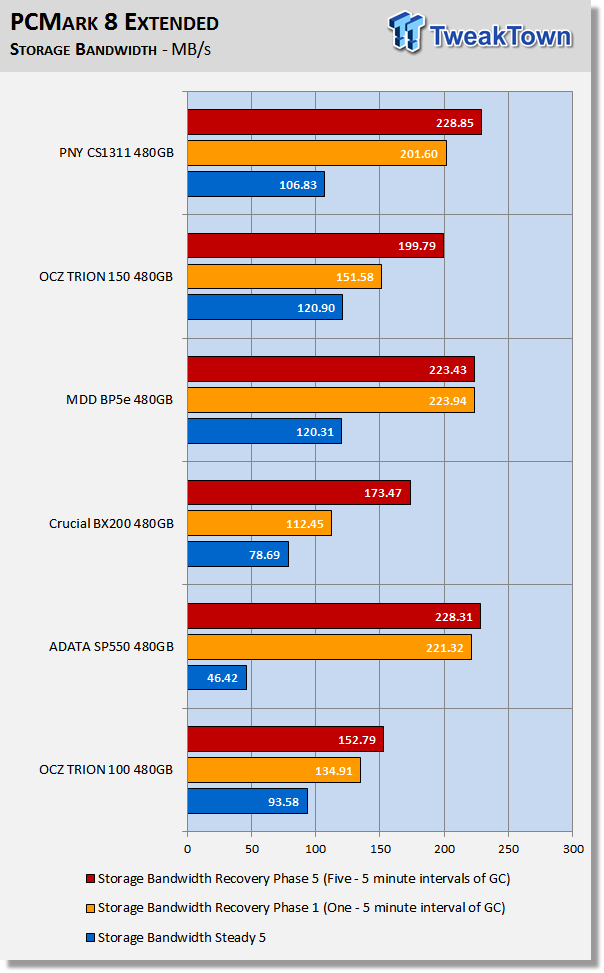
We consider steady state bandwidth (the blue bar) our test that carries the most weight in ranking a drive/arrays heavy workload performance. Performance after Garbage Collection (GC) (the orange and red bars) is what we consider the second most important consideration when ranking a drive's performance. Trace-based steady state testing is where true high performing SSDs are separated from the rest of the pack.
A steady state performance of 106 MB/s isn't anything to write home about, but it is significantly better than the SMI 2256-powered BX200 and SP550. SMI-powered SSDs have better moderate workload performance, but S10-powered SSDs have better heavy workload performance. OCZ's TRION 150 wins this test with the best steady-state performance. The CS1311 beats out the rest of the drives in our test pool after five intervals of garbage collection.
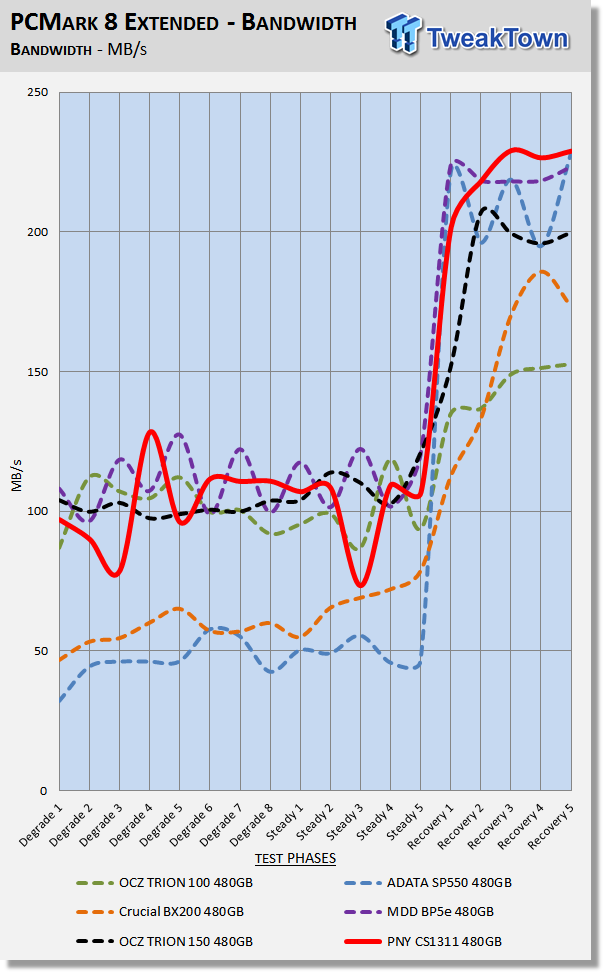
We chart our test subject's storage bandwidth as reported at each of the test's 18 trace iterations. This gives us a good visual perspective of how our test subjects perform as testing progresses. This chart sheds more light on how the drives perform as they progress through the testing phases.
Total Access Time (Latency)
We chart the total time the disk is accessed as reported at each of the test's 18 trace iterations.
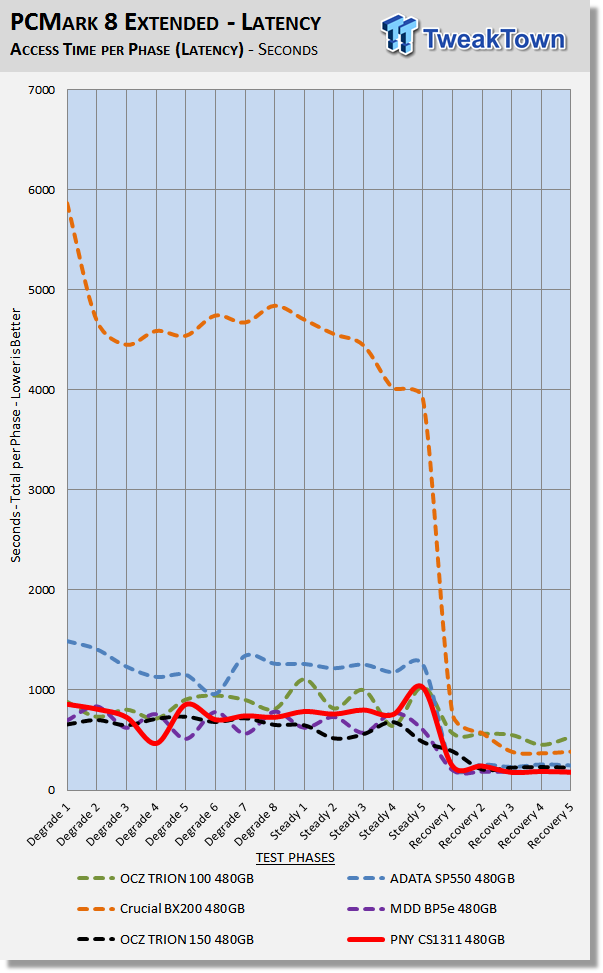
Low latency translates to the real-world as snappiness. Again the S10-powered SSDs have the edge over 2256-powered SSDs. The BX200 has insanely high (bad) latency.
Disk Busy Time
Disk Busy Time is how long the disk is busy working. We chart the total time the disk is working as reported at each of the tests 18 trace iterations.
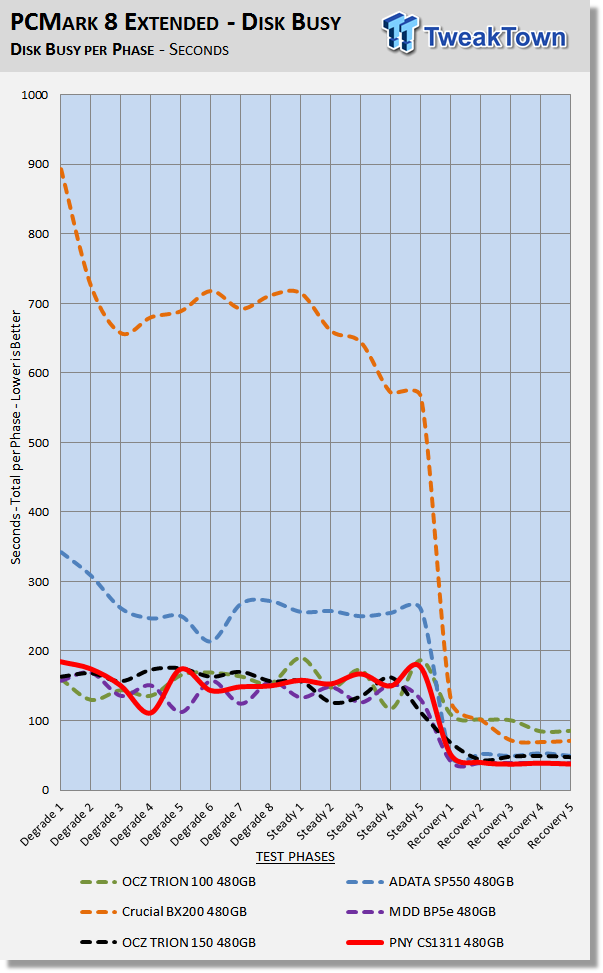
When latency is low, disk busy time is low as well.
Data Written
We measure the total amount of random data that our test drive/array is capable of writing during the degradation phases of the consistency test. Pre-conditioning data is not included in the total. The total combined time that degradation data is written to the drive/array is 470 minutes. This can be very telling. The better a drive/array can process a continuous stream of random data; the more data will be written.
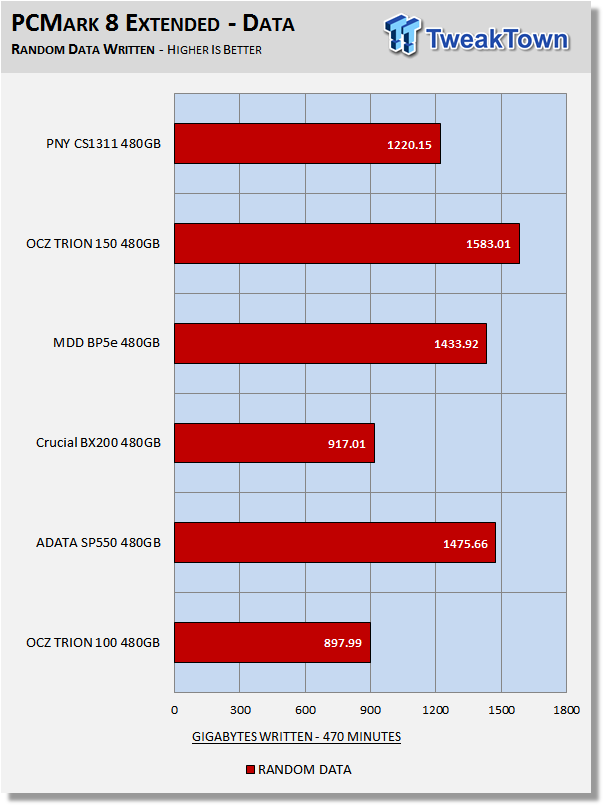
Write latency, capacity, and overprovisioning are the biggest factors that determine the outcome of this portion of the test. Here we see a win for OCZ's TRION 150.
Benchmarks (Secondary Volume) - 70/30 Mixed Workload
70/30 Mixed Workload Test (Sledgehammer)
Version and / or Patch Used: Iometer 2014
Heavy Workload Model
This test hammers a drive so hard we've dubbed it "Sledgehammer". Our 70/30 Mixed Workload test is designed to simulate a heavy-duty enthusiast/workstation steady-state environment. We feel that a mix of 70% read/30% write, full random 4K transfers best represents this type of user environment. Our test allows us to see the drive enter into and reach a steady state as the test progresses.
Phase one of the test preconditions the drive for 1 hour with 128K sequential writes. Phase two of the test runs a 70% read/30% write, full random 4K transfer workload on the drive for 1 hour. We log and chart (phase two) IOPS data at 5-second intervals for 1 hour (720 data points). 60 data points = 5 minutes.
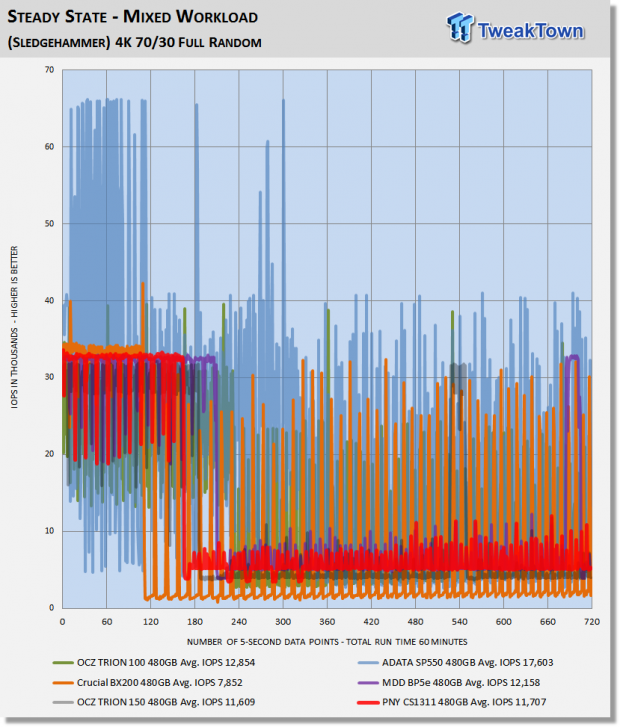
What we like about this test is that it reflects reality. Everything lines up, as it should. Consumer drives don't outperform Enterprise-Class SSDs that were designed for enterprise workloads. Consumer drives based on old technology are not outperforming modern Performance-Class SSDs, etc.
The CS1311 delivers performance that falls right between the BP5e and TRION 150. The SP550 wins this test with the highest average performance. However, it also displays massive variability.
Maxed-Out Performance (MOP)
This testing is just to see what the drive is capable of in an FOB (Fresh Out of Box) state under optimal conditions. We are utilizing Windows Server 2008 R2 64-bit for this testing. Same Hardware, just an OS change.
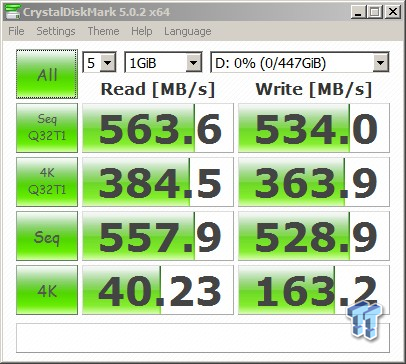
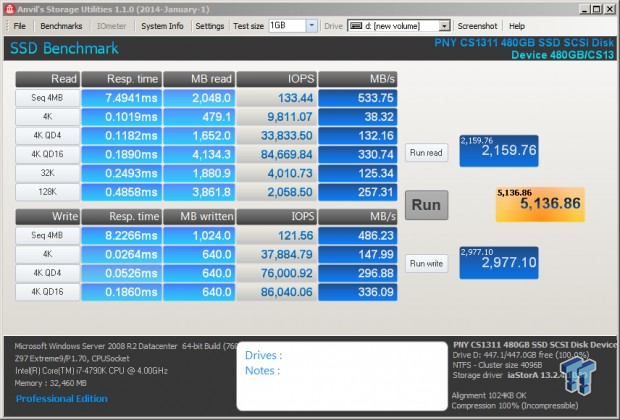
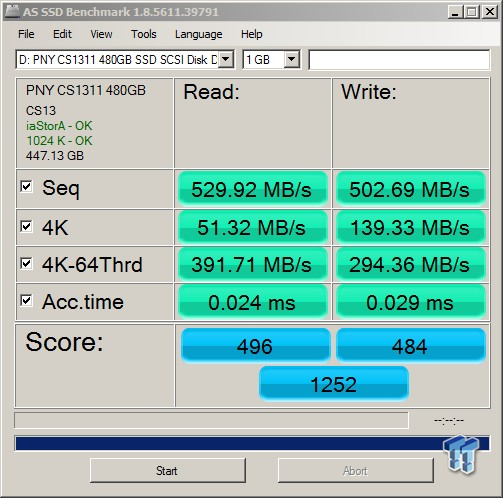
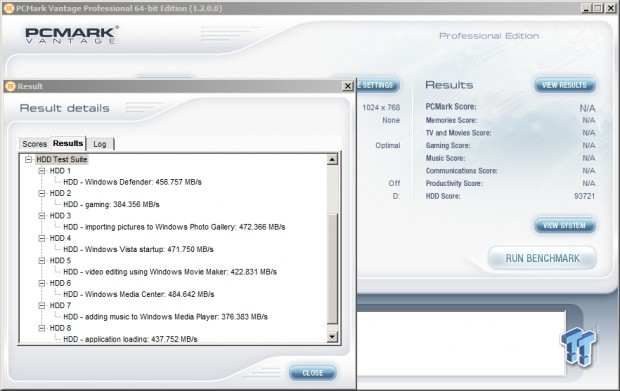
Final Thoughts
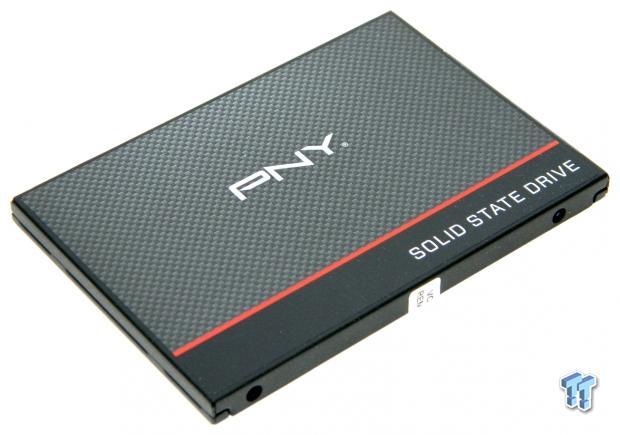
As expected, PNY's CS1311 is a synthetic powerhouse, which is good news for the majority of average users. One of the most important features of the S10, when paired with planar TLC flash, is Phison's direct to die write strategy. Phison skips the pSLC caching layer once it is filled and writes directly to the TLC flash array, instead of the conventional continuous fill/flush scheme employed by competing solutions. This bears fruit when transferring large files or installing large programs. Looking back at our write transfer testing, we can see the payoff.
The CS1311 stacks up well against similarly configured S10-powered planar TLC SSDs. The CS1311 is a great option for several reasons. It is an attractive piece of hardware, comes with Acronis disk cloning software, is sold by a well-respected vendor, and it is priced right - all the ingredients necessary for a superior entry-level SSD. If you have been waiting to give SSDs a try, the CS1311 affords you an excellent opportunity to jump in and live life in the fast lane.
Running PNY's CS1311 as our OS disk was a very pleasurable experience. The drive is responsive, boots like lightning, and handles multi-tasking with ease. Even though the CS1311 isn't the fastest SSD out there, for the majority of users, it will deliver an SSD experience that is a cut above most similarly priced SSDs on the market today.
PNY's C1311 480GB SATA III SSD is TweakTown recommended.
Pros:
- Low Cost
- Sustained Write
- Sequential Performance
Cons:
- Moderate Workload Performance

